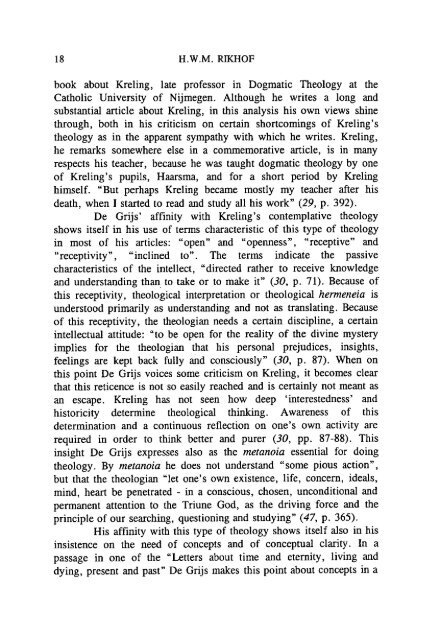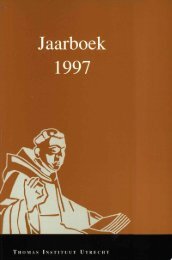Jaarboek Thomas Instituut 1995 - Thomas Instituut te Utrecht
Jaarboek Thomas Instituut 1995 - Thomas Instituut te Utrecht
Jaarboek Thomas Instituut 1995 - Thomas Instituut te Utrecht
You also want an ePaper? Increase the reach of your titles
YUMPU automatically turns print PDFs into web optimized ePapers that Google loves.
18 H.W.M. RIKHOF<br />
book about Kreling, la<strong>te</strong> professor in Dogmatic Theology at the<br />
Catholic University of Nijmegen. Although he wri<strong>te</strong>s a long and<br />
substantial article about Kreling, in this analysis his own views shine<br />
through, both in his criticism on certain shortcomings of Kreling's<br />
theology as in the apparent sympathy with which he wri<strong>te</strong>s. Kreling,<br />
he remarks somewhere else in a commemorative article, is in many<br />
respects his <strong>te</strong>acher, because he was taught dogmatic theology by one<br />
of Kreling's pupils, Haarsma, and for a short period by Kreling<br />
himself. "But perhaps Kreling became mostly my <strong>te</strong>acher af<strong>te</strong>r his<br />
death, when I star<strong>te</strong>d to read and study all his work" (29, p. 392).<br />
De Grijs' affinity with Kreling's con<strong>te</strong>mplative theology<br />
shows itself in his use of <strong>te</strong>rms charac<strong>te</strong>ristic of this type of theology<br />
in most of his articles: "open" and "openness", "receptive" and<br />
"receptivity" , "inclined to". The <strong>te</strong>rms indica<strong>te</strong> the passive<br />
charac<strong>te</strong>ristics of the in<strong>te</strong>llect, "direc<strong>te</strong>d rather to receive knowledge<br />
and understanding than. to take or to make it" (30, p. 71). Because of<br />
this receptivity, theological in<strong>te</strong>rpretation or theological hermeneia is<br />
understood primarily as understanding and not as translating. Because<br />
of this receptivity, the theologian needs a certain discipline, a certain<br />
in<strong>te</strong>llectual attitude: "to be open for the reality of the divine mys<strong>te</strong>ry<br />
implies for the theologian that his personal prejudices, insights,<br />
feelings are kept back fully and consciously" (30, p. 87). When on<br />
this point De Grijs voices some criticism on Kreling, it becomes clear<br />
that this reticence is not so easily reached and is certainly not meant as<br />
an escape. Kreling has not seen how deep 'in<strong>te</strong>res<strong>te</strong>dness' and<br />
historicity de<strong>te</strong>rmine theological thinking. Awareness of this<br />
de<strong>te</strong>rmination and a continuous reflection on one's own activity are<br />
required in order to think bet<strong>te</strong>r and purer (30, pp. 87-88). This<br />
insight De Grijs expresses also as the metanoia essential for doing<br />
theology. By metanoia he does not understand "some pious action",<br />
but that the theologian "let one's own exis<strong>te</strong>nce, life, concern, ideals,<br />
mind, heart be penetra<strong>te</strong>d - in a conscious, chosen, unconditional and<br />
permanent at<strong>te</strong>ntion to the Triune God, as the driving force and the<br />
principle of our searching, questioning and studying" (47, p. 365).<br />
His affinity with this type of theology shows itself also in his<br />
insis<strong>te</strong>nce on the need of concepts and of conceptual clarity. In a<br />
passage in one of the "Let<strong>te</strong>rs about time and e<strong>te</strong>rnity, living and<br />
dying, present and past" De Grijs makes this point about concepts in a








